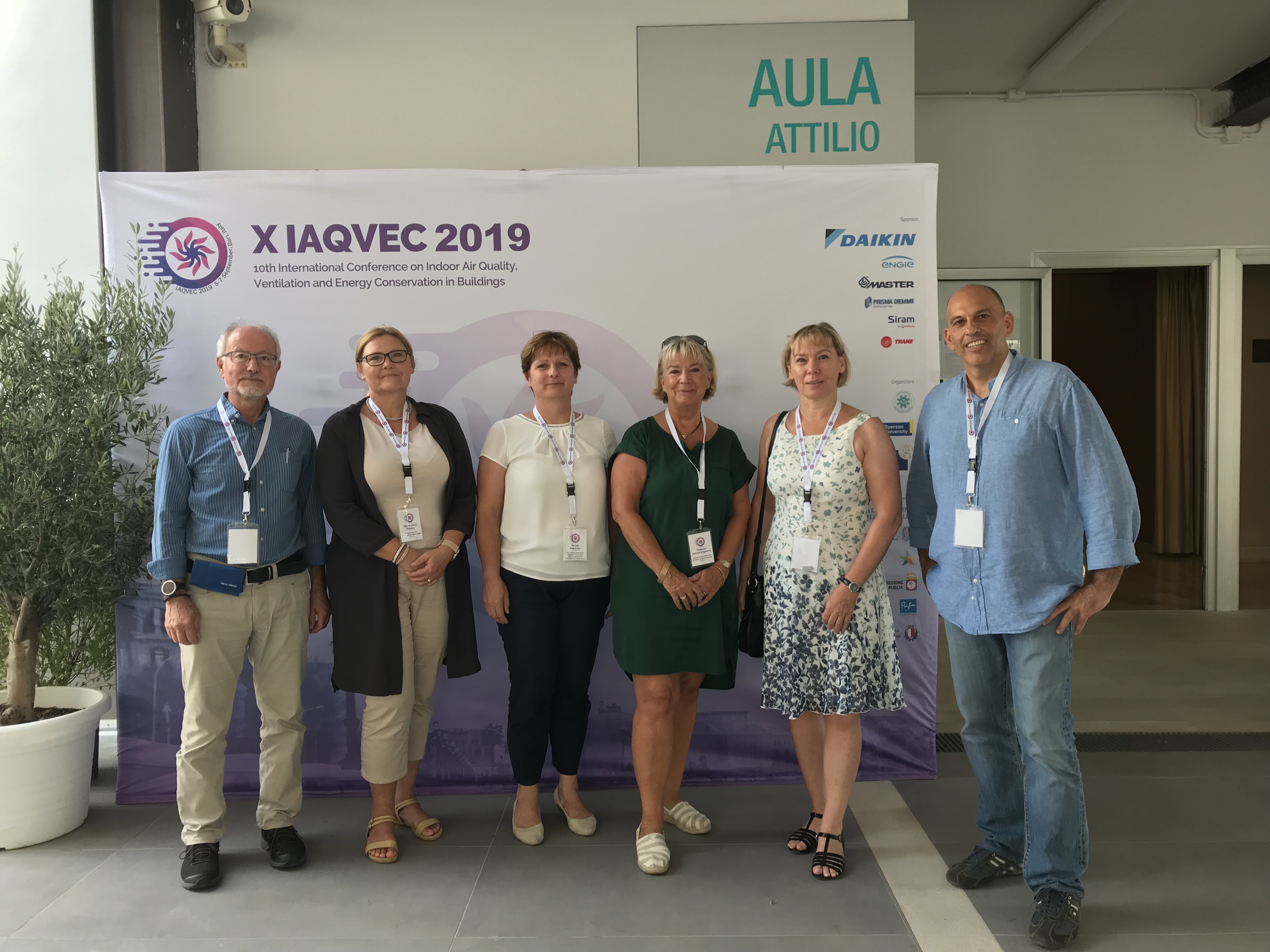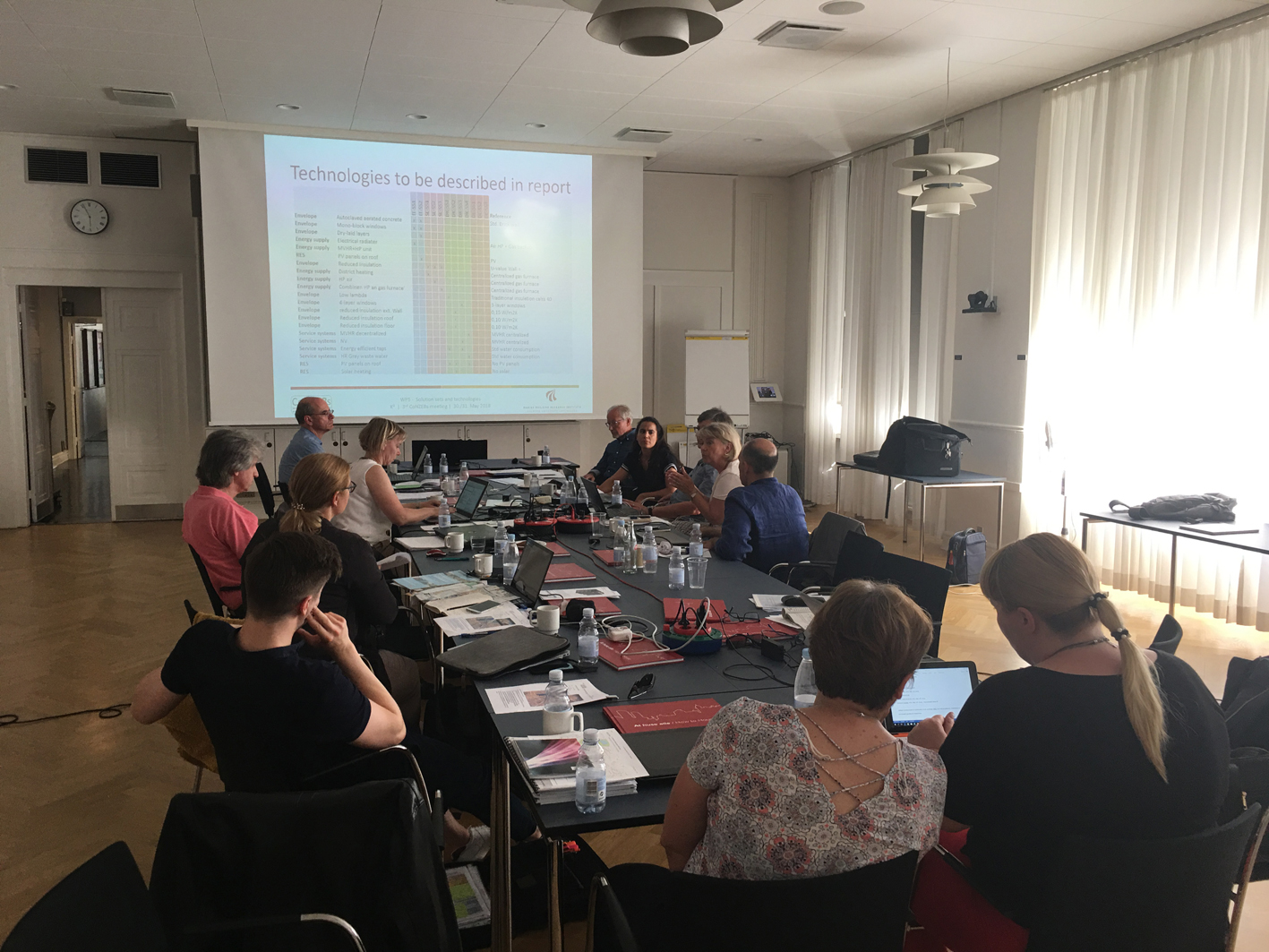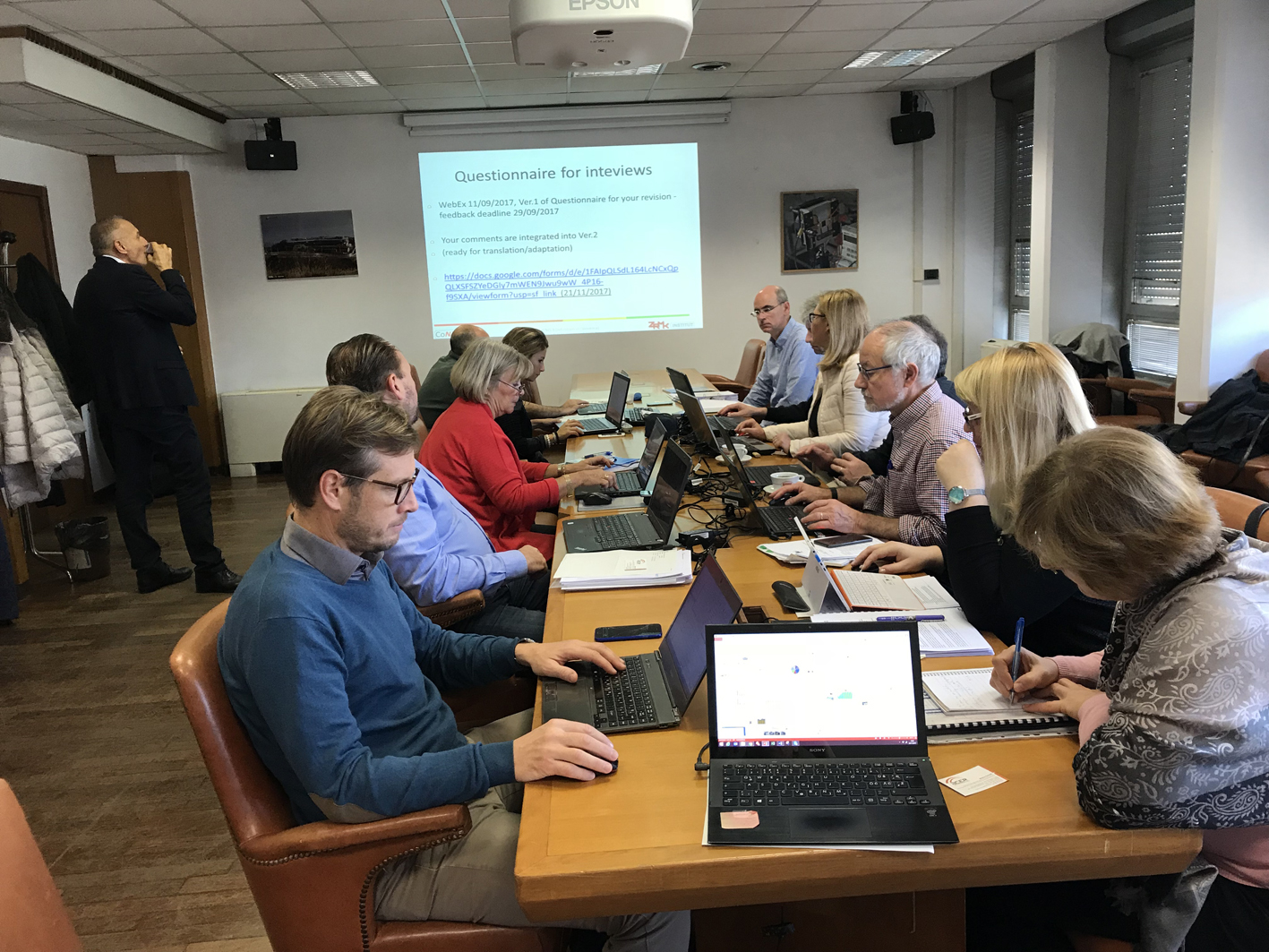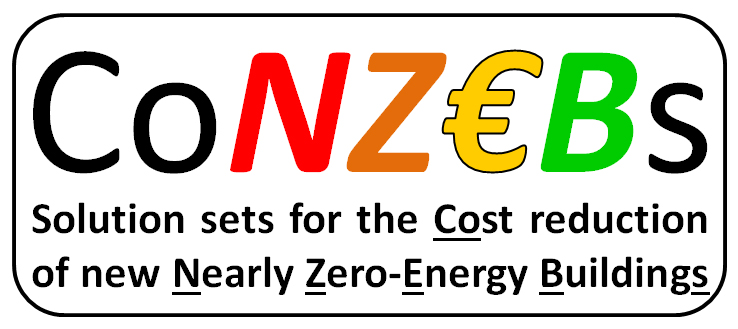The CoNZEBs project formed the main part of a session at the IAQVEC conference in Bari in September 2019. CoNZEBs project partner held in total 6 presentations including a project overview, different project results and one of the national exemplary NZEB buildings presented in the end-user brochure.

Photo: The CoNZEBs presenters at the IAQVEC 2019 conference in Bari. © Fraunhofer IBP
The papers are published as open source documents in IOP Conference Series: Materials Science and Engineering, Volume 609.
1. Cost-efficient Nearly Zero-Energy Buildings (NZEBs): H. Erhorn-Kluttig et al. -> paper / presentation
2. Survey and solutions for potential cost reduction in the design and construction process of nearly zero energy multi-family houses: M. Zinzi et al. -> paper / presentation
3. End-users' opinion on living in multi-family nearly zero-energy buildings: M. Šijanec Zavrl et al. -> paper / presentation
4. Solutions sets for cost optimisation of nearly zero energy buildings (NZEBs) in four European countries: K. B. Wittchen, K. Engelund Thomsen et al. -> paper / presentation
5. Life-cycle cost and environmental assessment of nearly zero-energy buildings (NZEBs) in four European countries: O. Mørck et al. -> paper / presentation
6. Model house F3 in Ljubljana – Nearly Zero-Energy Building: D. Varšek et al. -> paper / presentation
On 6th September 2019 the CoNZEBs project was the core of a session on Nearly Zero-Energy Buildings (NZEBs) at the 10th International Conference on Indoor Air Quality, Ventilation and Energy Conservation in Buildings (IAQVEC 2019). In total six presentations on the project and its outcomes have been held and discussed with the session attendants:
- Cost-efficient Nearly Zero-Energy Buildings - The CoNZEBs project presented by Heike Erhorn-Kluttig (Fraunhofer IBP)
- Survey and solutions to identify potential cost reduction in the design and construction process of nearly zero energy multi-family houses presented by Michele Zinzi (ENEA)
- End-users' opinion on living in multi-family Nearly Zero-Energy Buildings presented by Marjana Šiljanec Zavrl (GI ZRMK)
- Solution sets for the cost optimisation of Nearly Zero-Energy Buildings in four European countries presented by Kirsten Engelund Thomsen (SBi-AAU)
- Life-cycle costs and environmental assessment of Nearly Zero-Energy Buildings in four European countries presented by Ove Mørck (Kuben Management)
- Model House F3 in Ljubljana - Nearly Zero Energy Building presented by Damjana Varsek (SSRS)
The presentations attracted a comparably large crowd taking into account that five parallel sessions and a forum took place at the same time. Questions included the consideration of maintenance costs and the transferability of the alternative NZEB solution sets and the identified procedural cost-savings in the design and construction phase to other countries.
Photos: left: CoNZEBs presenters at the Bari IAQVEC conference; right: During the session.
Link to the conference website: www.iaqvec2019.org
On 13 June 2019 the national German CoNZEBs event was held in Saalbau Gutleut in Frankfurt. More than 110 practitioners and decision makers attended the event organised as a mix of presentations of nearly zero-energy buildings and beyond case studies and measures to reduce the construction costs. The CoNZEBs project and its outcomes, such as cost saving alternative solution sets to achieve the NZEB standard and their life-cycle assessment, were presented in detail and mirrored with the experiences and ideas of the audience by questions and answers and electronic polls.
Photos © Fraunhofer IBP
Photos © ABG Frankfurt Holding
Well-known architects and engineers as well as representatives from the Federal Institute for Research on Building, Urban Affairs and Spatial Development joined the German CoNZEBs team consisting of Fraunhofer IBP and ABG Frankfurt Holding. ABG Frankfurt Holding was the organiser of the event which was greatly appreciated by the audience and received a rating of 4.4 of maximum 5 points.
The programme, presentations and background information can be dowloaded from below.
Programme
00_Programm_Kostengünstiges und energieeffizientes Bauen.pdf
Presentations/background information
01: Kostengünstiges und energieeffizientes Bauen – RA Frank Junker (Vorsitzender der Geschäftsführung ABG Frankfurt Holding GmbH, Frankfurt/M.)
01_Kostengünstiges_energieeffizientes_Bauen_ABG_F_Junker_13_06_19.pdf
02: Die Effizienzhaus Plus-Initiative des BMI - Dipl.-Ing. Miriam Hohfeld (Bundesinstitut für Bau-, Stadt- und Raumforschung (BBSR), Bonn)
02_Effizienzhaus_Plus_Broschüre_BMI_BBSR.pdf
02a_Efficiency_House_Plus_brochure_english_BMI_BBSR.pdf
03: Kostensenken von Niedrigstenergiegebäuden: Europäisches Musterprojekt: "Frankfurter Klimaschutzhaus der ABG - RA Frank Junker (Vorsitzender der Geschäftsführung ABG Frankfurt Holding GmbH, Frankfurt/M. (Bauherr)), Prof. Dipl.-Ing. Michael Schumacher (Architekt BDA, Gesellschafter schneider+schumacher, Frankfurt/Wien/Tianjin (Architekt))
03_Frankfurter_Klimaschutzhaus_F_Junker_M_Schumacher_13_06_19.pdf
04: Solution Sets für die Baukostenreduktion von mehrgeschossigen Niedrigstenergiewohngebäuden (Ergebnisse aus dem EU-Forschungsprojekt CoNZEBs) - Dipl.-Ing. Heike Erhorn-Kluttig, Dipl.-Ing. Hans Erhorn (Projektkoordinatoren, Fraunhofer-Institut für Bauphysik IBP, Stuttgart)
05: Zukunftsweisende Energiekonzepte für Wohngebäude und -quartiere - Dr. Boris Mahler (Geschäftsführer EGS-plan Ingenieurgesellschaft für Energie-, Gebäude- und Solartechnik mbH, Stuttgart)
05_Zukunftsweisende_Energiekonzepte_Wohngebäude_Quartiere_B_Mahler_13_06_19.pdf
06: Kostengünstiger und zukunftsfähiger Geschosswohnungsbau im Quartier - Dr. Burkhard Schulze Darup (Architekt, Berlin)
06_Kostengünstiger_zukunftsfähiger_Wohnungsbau_im_Quartier_B_Schulze_Darup_13_06_19.pdf
06a_Projektbericht_Zukunftsfähiger_Wohnungsbau_im_Quartier_DBU.pdf
07: Kostensenkungspotenziale durch "Serielles Bauen" und "BIM" - Dr. Arnd Rose (Bundesinstitut für Bau-, Stadt- und Raumforschung (BBSR))
07_Serielles_Bauen_BIM_A_Rose_13_06_19.pdf
Event evaluation
08_Poll_Results_CoNZEBs_Event_Veranstaltungsbewertung_13_06_19.pdf
The EU H2020 project CoNZEBs is getting into the final project phase and will present the project outcomes at national events in all four participant countries. The German event, organised by ABG Frankfurt Holding and project coordinator Fraunhofer Institute for Building Physics will take place in Frankfurt on 13 June 2019. The event will analyse how to build energy and cost-efficient multi-family houses on the level of nearly zero-energy buildings. The solutions identified in the project include technical measures at the building envelope and the building services systems as well as process-related measures during the planning and the construction phase. The project outcomes will be discussed with stakeholders and the interested audience.
The programme contains additional presentations by well-known architects and engineers and representatives of the German Building Ministry and the Federal Institute for Research on Building, Urban Affairs and Spatial Development. A focus will be on the "Frankfurter Klimaschutzhaus", a new cost-efficient high performance building of ABG Frankfurt Holding that will be presented by Frank Junker.
The participation in the event is free of costs, however the number of participants is limited. Please register via the internet portal www.abgnova.de at the section "Fachseminare". The language of the event will be German.
For further information see the event flyer.
On 30-31 May 2018 the CoNZEBs partners met in Copenhagen at the office of BL for their 3rd project meeting. This is a busy phase for the project as several tasks and corresponding deliverables are due very soon. We have discussed draft results for the technical solution sets to reduce the costs of nearly zero-energy buildings (NZEBs). Additionally the evaluation of the national questionnaires for end-users and for designers and constructors have been presented and compared. Last but not least we agreed on the planned methods for the life-cycle assessment and the life-cycle costs, have brainstormed on evolving parameters concerning future technical solution sets and reviewed the dissemination activities.
The next meeting is planned in Ljubljana in November 2018.

Hard work during the 3rd CoNZEBs meeting in Copenhagen.
The CoNZEBs project partners discussed first work results and made detailed plans for the upcoming tasks during the meeting at the ENEA headquarter in Rome end of November 2017. The discussions focussed on the methodology for assessing the technology solution sets regarding their cost savings in nearly zero-energy buildings (NZEB) and on the soon to be distributed questionnaires to tenants and designers.
The next meeting is planned in Copenhagen at the end of May 2018.

Project partners during the 2nd CoNZEBs meeting in Rome.
BUILD UP, the European Portal for Energy Efficiency in Buildings compiles overview article on specific topics providing the reader with insights on current developments in policy, research and building practice. In October 2017 an overview article on “Cost reduction of new Nearly Zero-Energy Buildings: Which projects are in the pipeline?” was published featuring CoNZEBs together with other actual European projects. The article summarises the content of the projects and links to available outcomes.
Read the overview article here.
On 13 and 14 June 2017 the first meeting of the EU Horizon 2020 project CoNZEBs took place at the Fraunhofer-Forum in Berlin. Fourteen participants from the partner organisation and three members of the German Advisory Board to the project met and discussed the project content and planned outcomes in order divide tasks and define action items. For each of the four countries the national NZEB definition and a practical application at a multi-family house was presented. Ideas for cost-efficient NZEB technologies and the cost reduction in design and planning processes have been gathered and discussed. A case study visit to the LaVidaVerde building (link), a multi-family house in efficiency house plus standard offered the possibility to see a practical application of a high performance building with low investment costs.
The next meeting is planned in Rome at the ENEA headquarters in November 2017.
Group photo of the CoNZEBs partners (left) and photo of the LaVidaVerde efficiency house plus (right).

